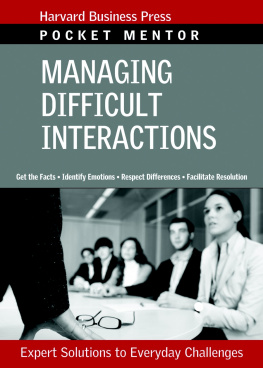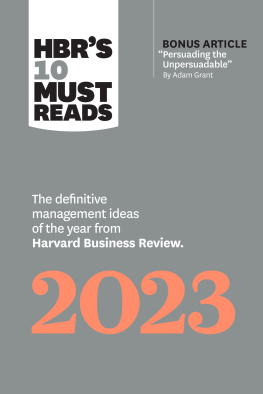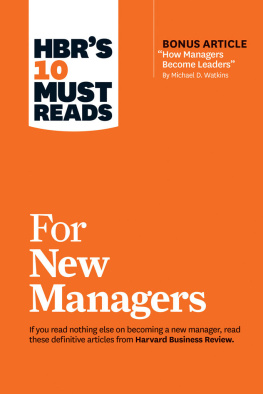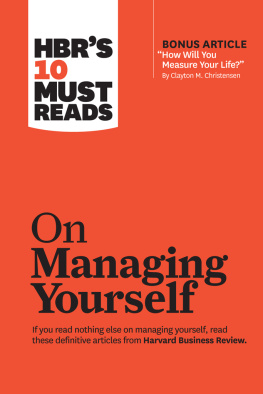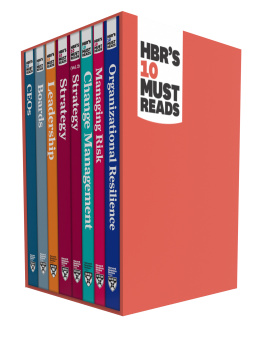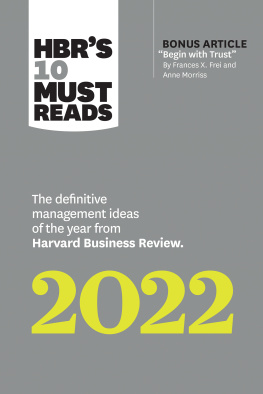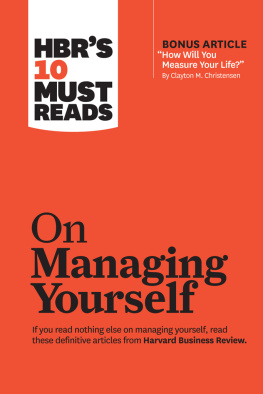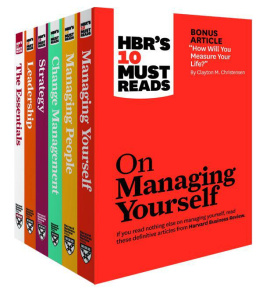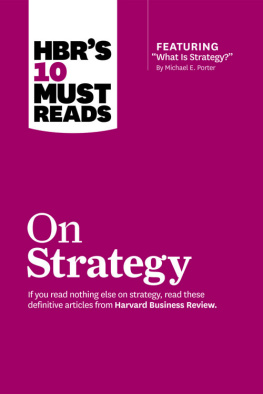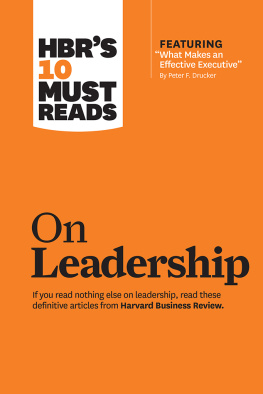Harvard Business Review (COR) - HBRs 10 Must Reads on Sales with Bonus Interview of Andris Zoltners
Here you can read online Harvard Business Review (COR) - HBRs 10 Must Reads on Sales with Bonus Interview of Andris Zoltners full text of the book (entire story) in english for free. Download pdf and epub, get meaning, cover and reviews about this ebook. year: 2017, publisher: Lightning Source Inc, genre: Business. Description of the work, (preface) as well as reviews are available. Best literature library LitArk.com created for fans of good reading and offers a wide selection of genres:
Romance novel
Science fiction
Adventure
Detective
Science
History
Home and family
Prose
Art
Politics
Computer
Non-fiction
Religion
Business
Children
Humor
Choose a favorite category and find really read worthwhile books. Enjoy immersion in the world of imagination, feel the emotions of the characters or learn something new for yourself, make an fascinating discovery.

- Book:HBRs 10 Must Reads on Sales with Bonus Interview of Andris Zoltners
- Author:
- Publisher:Lightning Source Inc
- Genre:
- Year:2017
- Rating:3 / 5
- Favourites:Add to favourites
- Your mark:
- 60
- 1
- 2
- 3
- 4
- 5
HBRs 10 Must Reads on Sales with Bonus Interview of Andris Zoltners: summary, description and annotation
We offer to read an annotation, description, summary or preface (depends on what the author of the book "HBRs 10 Must Reads on Sales with Bonus Interview of Andris Zoltners" wrote himself). If you haven't found the necessary information about the book — write in the comments, we will try to find it.
HBRs 10 Must Reads on Sales with Bonus Interview of Andris Zoltners — read online for free the complete book (whole text) full work
Below is the text of the book, divided by pages. System saving the place of the last page read, allows you to conveniently read the book "HBRs 10 Must Reads on Sales with Bonus Interview of Andris Zoltners" online for free, without having to search again every time where you left off. Put a bookmark, and you can go to the page where you finished reading at any time.
Font size:
Interval:
Bookmark:
HBRs 10 Must Reads series is the definitive collection of ideas and best practices for aspiring and experienced leaders alike. These books offer essential reading selected from the pages of Harvard Business Review on topics critical to the success of every manager.
Titles include:
HBRs 10 Must Reads 2015
HBRs 10 Must Reads 2016
HBRs 10 Must Reads 2017
HBRs 10 Must Reads for New Managers
HBRs 10 Must Reads on Change Management
HBRs 10 Must Reads on Collaboration
HBRs 10 Must Reads on Communication
HBRs 10 Must Reads on Emotional Intelligence
HBRs 10 Must Reads on Innovation
HBRs 10 Must Reads on Leadership
HBRs 10 Must Reads on Making Smart Decisions
HBRs 10 Must Reads on Managing Across Cultures
HBRs 10 Must Reads on Managing People
HBRs 10 Must Reads on Managing Yourself
HBRs 10 Must Reads on Sales
HBRs 10 Must Reads on Strategic Marketing
HBRs 10 Must Reads on Strategy
HBRs 10 Must Reads on Teams
HBRs 10 Must Reads: The Essentials
HBR Press Quantity Sales Discounts
Harvard Business Review Press titles are available at significant quantity discounts when purchased in bulk for client gifts, sales promotions, and premiums. Special editions, including books with corporate logos, customized covers, and letters from the company or CEO printed in the front matter, as well as excerpts of existing books, can also be created in large quantities for special needs.
For details and discount information for both print and ebook formats, contact .
Copyright 2017 Harvard Business Publishing Corporation
All rights reserved
No part of this publication may be reproduced, stored in or introduced into a retrieval system, or transmitted, in any form, or by any means (electronic, mechanical, photocopying, recording, or otherwise), without the prior permission of the publisher. Requests for permission should be directed to , or mailed to Permissions, Harvard Business School Publishing, 60 Harvard Way, Boston, Massachusetts 02163.
First eBook Edition: May 2017
ISBN: 978-1-63369-327-2
eISBN: 978-1-63369-328-9
by Thomas V. Bonoma
You dont understand: Willy was a salesman. He dont put a bolt to a nut. He dont tell you the law or give you medicine. Hes a man way out there in the blue, riding on a smile and a shoeshine. And when they start not smiling backthats an earthquake.
Arthur Miller, Death of a Salesman
MANY COMPANIES SELLING EFFORTS are models of marketing efficiency. Account plans are carefully drawn, key accounts receive special management attention, and substantial resources are devoted to the sales process, from prospect identification to postsale service. Even such well-planned and well-executed selling strategies often fail, though, because management has an incomplete understanding of buying psychologythe human side of selling. Consider the following two examples:
A fast-growing maker and seller of sophisticated graphics computers had trouble selling to potentially major customers. Contrary to the industry practice of quoting high list prices and giving large discounts to users who bought in quantity, this company priced 10% to 15% lower than competitors and gave smaller quantity discounts. Even though its net price was often the lowest, the company met resistance from buyers. The reason, management later learned, was that purchasing agents measured themselves and were measured by their superiors less by the net price of the sophisticated computers they bought than by the amount deducted from the price during negotiations. The discount had a significance to buyers that sound pricing logic could not predict.
Several years ago, at AT&Ts Long Lines division, an account manager was competing against a vendor with possibly better technology who threatened to lure away a key account. Among the customers executives who might make the final decision about whether to switch from Bell were a telecommunications manager who had once been a Bell employee, a vice president of data processing who was known as a big-name system buster in his previous job because he had replaced all the IBM computers with other vendors machines, and an aggressive telecommunications division manager who seemed to be unreachable by the AT&T team.
AT&Ts young national account manager was nearly paralyzed by the threat. His team had never seriously considered the power, motivations, or perceptions of the various executives in the customer company, which had been buying from AT&T for many years. Without such analysis, effective and coordinated action on short noticethe usual time available for response to sales threatswas impossible.
How can psychology be used to improve sales effectiveness? My contention is that seller awareness of and attention to the human factors in purchasing will produce higher percentages of completed sales and fewer unpleasant surprises in the selling process.
It would be inaccurate to call the human side of selling an emerging sales concern; only the most advanced companies recognize the psychology of buying as a major factor in improving account selection and selling results. Yet in most industries, the bulk of a companys business comes from a small minority of its customers. Retaining these key accounts is getting increasingly difficult as buyers constantly look not only for the best deal but also for the vendor that best understands them and their needs. It is this understanding and the targeted selling that results from it that can most benefit marketing managers.
When is a buyer not really a buyer? How can the best product at the lowest price turn off buyers? Are there anonymous leaders who make the actual buying decisions? As these questions suggest, the reality of buying and selling is often not what it seems. Whats more, salespeople often overlook the psychological and emotional factors that figure strongly in buying and selling. By failing to observe these less tangible aspects of selling, a vendor can lose sales without understanding why.
In this article, first published in 1982, Bonoma sets up a procedure for analyzing buying decisions and tells sellers how to apply the resulting framework to specific situations. Steps in the procedure include the following:
- Identifying the actual decision makers. Though it may come as a surprise, power does not correlate perfectly with organizational rank. The author outlines five bases of power and offers six behavioral clues for identifying the real decision makers.
- Determining how buyers view their self-interest. All buyers act selfishly, but they sometimes miscalculate. As a result, diagnosing motivation is one of the most difficult management tasks to do accurately. The author suggests several techniques to determine how buyers choose their own self-interest.
- Gathering and applying psychological intelligence. There is no formula for placing sound psychological analyses magically in the sales staffs hands. However, the author offers three guidelinesmake sure that sales calls are highly productive and informative, listen to the sales force, and reward rigorous fact gathering, analysis, and executionto help managers increase sales effectiveness.
The personal aspects and their complexities become apparent when one looks closely at an example of the buying process: the purchase of a business jet, which carries a price tag in excess of $3 million. The business-jet market splits obviously into two segments: those companies that already own or operate a corporate aircraft and those that do not.
In the owner market, the purchase process may be initiated by the chief executive officer, a board member (wishing to increase efficiency or security), the companys chief pilot, or through vendor efforts like advertising or a sales visit. The CEO will be central in deciding whether to buy the jet, but he or she will be heavily influenced by the companys pilot, financial officer, and perhaps by the board itself.
Next pageFont size:
Interval:
Bookmark:
Similar books «HBRs 10 Must Reads on Sales with Bonus Interview of Andris Zoltners»
Look at similar books to HBRs 10 Must Reads on Sales with Bonus Interview of Andris Zoltners. We have selected literature similar in name and meaning in the hope of providing readers with more options to find new, interesting, not yet read works.
Discussion, reviews of the book HBRs 10 Must Reads on Sales with Bonus Interview of Andris Zoltners and just readers' own opinions. Leave your comments, write what you think about the work, its meaning or the main characters. Specify what exactly you liked and what you didn't like, and why you think so.

